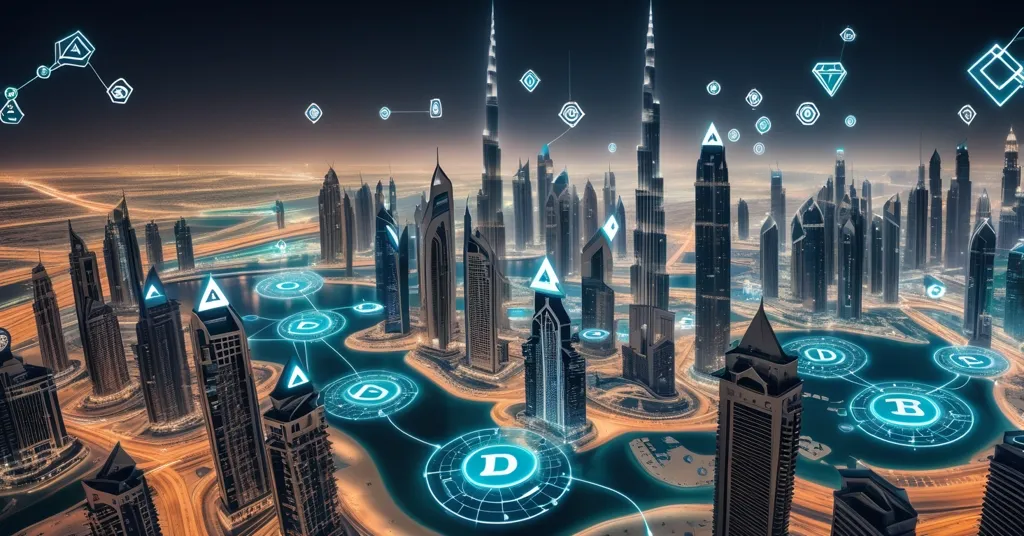Dubai Launches Real Estate Tokenization Pilot to Revolutionize Property Market

Dubai’s Real Estate Revolution: Launching the Tokenization Pilot
Dubai has kicked off the pilot phase of its Real Estate Tokenization Project, a bold move to transform the real estate sector using blockchain technology. Led by the Dubai Land Department (DLD), this initiative aims to tokenize property title deeds, boosting liquidity and enabling fractional ownership. This project, in collaboration with the Dubai Virtual Assets Regulatory Authority (VARA) and Dubai Future Foundation (DFF) through Sandbox Dubai, positions Dubai as a pioneer in the Middle East and a global hub for virtual assets.
- Pilot phase of Dubai’s Real Estate Tokenization Project launched.
- Aim to enhance liquidity and enable fractional ownership through tokenization.
- Collaborative effort involving VARA and DFF through Sandbox Dubai.
- Projected market growth to AED 60 billion by 2033.
Imagine owning a piece of Dubai’s skyline with just a few clicks. That’s the future Dubai is building with its new real estate tokenization project. The Dubai Land Department (DLD) is at the forefront, tokenizing property title deeds to revolutionize the real estate market. Tokenization, in simple terms, means converting real estate ownership into digital pieces (or tokens) on a blockchain, which can be easily bought and sold. This allows investors to own fractions of properties, opening up investment opportunities to a broader audience.
This initiative doesn’t stand alone. It’s part of a larger collaborative effort with the Dubai Virtual Assets Regulatory Authority (VARA) and the Dubai Future Foundation (DFF) through Sandbox Dubai. This partnership underscores Dubai’s commitment to a robust regulatory and innovative framework, aligning with its ambition to be a global leader in virtual assets.
Dubai aims to be the first in the Middle East to implement this kind of tokenization on property title deeds. To drive this forward, the DLD organized a workshop with leading global proptech companies, showcasing Dubai’s dedication to gathering the best minds to innovate the real estate sector.
The objectives of the Real Estate Tokenization Project are multifaceted: attract global tech firms, diversify property ownership, promote investment awareness, foster innovation, and cement Dubai’s position as a hub for virtual assets. This aligns with Dubai’s broader strategy to shift its economy from oil dependency towards technology and finance sectors.
Marwan Ahmed Bin Ghalita, Director General of Dubai Land Department, expressed his vision confidently:
“DLD anticipates that this groundbreaking initiative will drive significant growth in the real estate tokenisation sector, with its market value projected to reach AED 60 billion by 2033, representing 7% of Dubai’s total real estate transactions.”
This ambitious forecast highlights the potential impact of tokenization on Dubai’s real estate market.
The project is a component of the broader Real Estate Innovation Initiative (REES), designed to attract technology firms. Additionally, the Dubai Financial Services Authority (DFSA) has launched a Tokenization Regulatory Sandbox within the Dubai International Financial Centre (DIFC). This controlled environment allows businesses to experiment with tokenization, further supporting Dubai’s innovative ecosystem.
As the global real estate market explores blockchain technology to enhance liquidity and accessibility, Dubai’s proactive regulatory environment, bolstered by entities like VARA and the DFSA, sets the stage for a future where real estate investment is more inclusive and efficient. However, amidst the excitement, it’s crucial to acknowledge potential challenges. Regulatory hurdles, market adoption rates, and the need for investor education are critical factors that could impact the project’s success. It’s all well and good to dream of owning a piece of the Burj Khalifa without needing a skyscraper-sized bank account, but let’s not forget the hard work ahead.
While Dubai’s initiative is groundbreaking, it’s essential to consider the broader implications. Tokenization could disrupt traditional real estate markets by increasing liquidity and accessibility, but it also presents risks like cybersecurity concerns and the need for robust legal frameworks. It’s a fine balance between optimism and realism, and Dubai’s move could serve as a model for other cities and countries navigating this new frontier.
Key Takeaways and Questions
- What is the Dubai Real Estate Tokenization Project?
The Dubai Real Estate Tokenization Project is a pilot project by the Dubai Land Department (DLD) aimed at tokenizing real estate properties on the blockchain to enhance liquidity and enable fractional ownership.
- Who are the key collaborators in this project?
The project involves collaboration with the Dubai Virtual Assets Regulatory Authority (VARA) and the Dubai Future Foundation (DFF) through Sandbox Dubai.
- What are the objectives of the project?
The objectives include attracting global technology firms, diversifying property ownership, promoting investment awareness, fostering real estate innovation, and solidifying Dubai’s position as a regional and global hub for virtual assets.
- What growth does DLD anticipate from this initiative?
DLD expects the real estate tokenization market to reach AED 60 billion by 2033, representing 7% of Dubai’s total real estate transactions.
- How does this project fit into broader initiatives in Dubai?
It is part of the Real Estate Innovation Initiative (REES) and aligns with Dubai’s efforts to become a global hub for virtual assets, supported by regulatory frameworks like the Tokenization Regulatory Sandbox.



